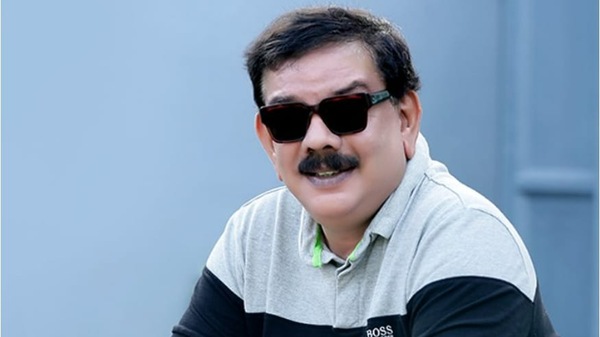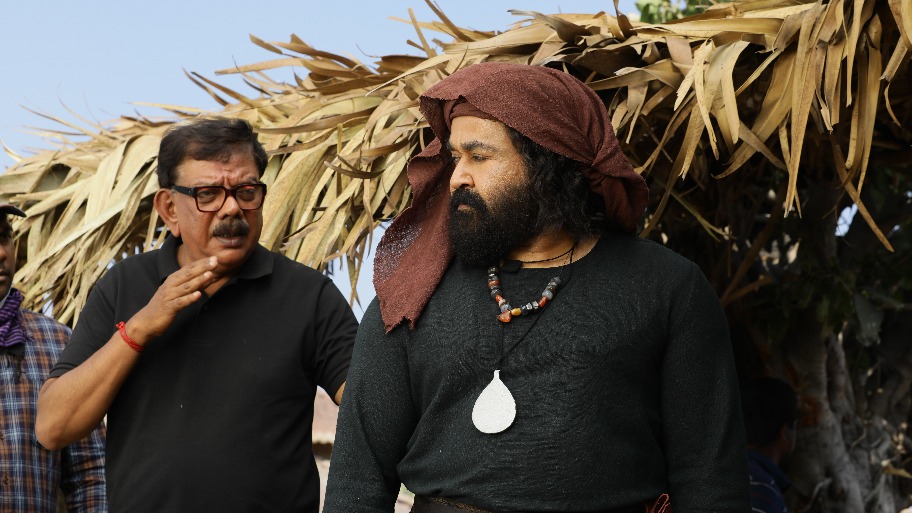Exclusive! Priyadarshan: In South, people overanalyse and so you have to present humour sensibly
The filmmaker talks to OTTplay about his upcoming segment from Netflix anthology Navarasa, the status of Marakkar: Arabikadaline Simham, the feedback for Hungama 2 and his upcoming boxing movie with Mohanlal

Last Updated: 05.28 PM, Aug 02, 2021
For someone whose big-screen movies have been celebrated by the audience, what has kept director Priyadarshan busy this year has been the OTT releases. The filmmaker’s Hungama 2 premiered on Disney+ Hotstar last month and he has also shot a segment titled Summer of ’92 in the upcoming Netflix anthology, Navarasa, which will drop on August 6. But that’s not all, the filmmaker has just finished a round of discussions with MT Vasudevan Nair in Kozhikode for another segment in an upcoming Netflix anthology based on the Malayalam literary doyen’s works.
While the filmmaker is tight-lipped about his project or the discussions, in this exclusive OTTplay interview, he does open up about his work in Navarasa, the feedback for Hungama 2 and the status of two projects with Mohanlal – Marakkar: Arabikadalinte Simham and a movie on boxing.
Netflix’s upcoming anthology Navarasa is probably the most-anticipated release this week, with a bunch of stellar talents associating with the project backed by Mani Ratnam. Tell us about how you came onboard.
I wasn’t originally part of Navarasa. But Mani called me one day and told me that he wanted me to do the segment on ‘haasya’. I was a bit confused as to how to make people laugh in 30 minutes. But Mani said, ‘I am sure you are capable of doing it’. I share a great relationship with him and respect him as a filmmaker and a human being; he’s a good friend too. Because he has asked me something for the first time, I also thought it would be good to work with him.
Then I thought of making something like Malgudi Days. My son (Siddharth) then told me that I had narrated something to him about an incident from (actor) Innocent’s childhood. I had forgotten this and so when he mentioned this to me, I approached Innocent for its rights and he asked me to go ahead. I took that idea and developed it. When I narrated it to Mani, he loved it. So, it was a 10-day shoot and I am happy about how it has turned out.
It’s a stretch when someone like you, who is responsible for some of the best comedies in Malayalam cinema, says that you were confused about making people laugh.
I can think of a film, but you can’t make a segment based just on jokes. There has to be a storyline and incidents; generally, I depend on situations for the humour in my films. Today morning, I was reading that Hungama 2 got 7.6 million views this week, which is much ahead of the other films streaming now. So, the reviews and opinions don’t matter at all for viewers. People who have seen the original 1994 Mohanlal movie Minnaram (Disney+ Hotstar) might not have liked Hungama 2, but those who are enjoying it are laughing based on the situations and not the performances. That’s why I wanted situations and was looking for something of that sort for the Navarasa segment. Zeroing in on something like that for a 30-minute segment is the challenge. I personally believe the Summer of ’92 is one of my good works.
Something like Boeing Boeing (Disney+ Hotstar) had a string of hilarious situations but Mithunam (Disney+ Hotstar) is more of a satire. What are the challenges of making both these kinds of films?
I think it’s about knowing the kind of audience the film caters to. When I make a Hindi film, I am not thinking about conveying anything. That’s why I ask people to keep their brains at home, and consequently the audience in the North enjoy the film. Down South, people analyse and so you have to present the humour with more sensibilities. But when people are watching the film just for entertainment, you can avoid certain kinds of logic and compromise on a lot of aspects. That’s the difference when I make films for North and South.
So, is it deliberate that most of your work in Bollywood are remakes and some of your more serious attempts are made in the South?
I tried making original films in Bollywood too, but except for Malamaal Weekly, the other movies didn’t work. In the South, I am very sure about what I am delivering. So, I am not bothered about what people think. You cannot compare Mohanlal to Meezan, who is a newcomer. Mohanlal is one of the greatest actors India has ever seen; so there really is no comparison. The people of Bihar or Uttar Pradesh, where you get the biggest collections from, haven’t seen Mohanlal’s work; for them these are fresh films. Their expectations aren’t based on how Mohanlal’s role is played by someone else. They are not going to compare; that is only done by reviewers.
That’s why I was shocked to see Hungama 2’s views. It’s almost thrice the number of views of original Hindi films. So, according to me, the layman of North accepts films as they are, they don’t shred and analyse them. This is why it’s easier to make films for them and I get to choose what I like to make. I am not bothered about remaking films in Bollywood. If you notice, most Bollywood remakes have been flops, I am probably the only one who has succeeded. I have made 30 films in Bollywood. If there weren’t hits, I wouldn’t have survived as a filmmaker there for so long.
A filmmaker of your stature can make a movie like Marakkar: Arabikadalinte Simham on a much bigger scale in Bollywood and yet you chose to do that in the South. Why?
When I am making a movie in Malayalam, I enjoy every moment. It will have improvisations; the language is completely under my command and I know the culture extremely well. When I go to the North, I don’t understand their culture as much as I do Malayalam. So, if you see Bhool Bhulaiyaa, the remake of Manichitratazhu (Disney+ Hotstar), I have forcefully made it look like a Hindi film. When you do that, you lose some refinement but it’s done with the idea of making the North audience feel that it’s their film. They shouldn’t feel alien to the look or the culture of the movie; only then they would feel they are watching it as a Hindi movie.
In an interview from the early 2000s, Jagathy Sreekumar had said that in Malayalam there are just a handful of actors even though it has a lot of stars. The ones he had mentioned were Mohanlal, Nedumudi Venu, Thilakan and Oduvil Unnikrishnan – all of whom you had worked with in the better part of your career. Now, do you sort of miss what they bring in terms of performances to your movies?
I miss them badly – from Pappuettan to Jagathy. But at the same time, as time changes, we have to adapt too. You have to become aware of what the audience likes to see now. People don’t have patience now; they don’t have time. You have to identify what you want – exaggeration or realism. If you are making a comedy, you have to have the right mix of both. Otherwise, it’s better to stick with straight and serious films.
That’s where a Kanchivaram (Disney+ Hotstar) or Sila Samayangalil (Netflix) comes from?
Exactly. Also films like Kaalapani and even Marakkar, which are serious films. You don’t have to worry about making people laugh in these movies because that’s the most difficult thing to do. Everything else is easy.
Your segment in Navarasa, Summer of ’92, also has a good mix of Malayalam and Tamil actors.
Yes, but Remya Nambeesan also has done Tamil films. The segment is about five children. It’s about the childhood of Yogi Babu’s character. Only Manikuttan and Venu chettan are the Malayalam actors. After Mohanlal, I have worked the most with Venu chettan. Also, he probably has acted in my films the most. So, there’s a huge comfort level between us.
He also plays the Zamorin in your magnum opus Marakkar. Is there any update on the film’s release date?
Unless and until theatres reopen, we can’t decide the date. But it will be a theatrical release. I don’t feel the pressure because I believe in my film. People know that the movie is ready but the pandemic is the reason it’s not releasing; it’s not like there was a stop-start schedule or it was canned midway.

What did Marakkar winning the National Award for Best Feature Film this year mean to you?
My first National Award came for Kanchivaram, which many perceive was made on the lines of an art film. But this time, I am enjoying it more because I am basically a commercial filmmaker. Getting acceptance for a film, which is made keeping in mind the commercial aspects, is more encouraging to me than a movie made only for awards.
There’s another rumour of a boxing film in the works with you and Mohanlal. Can you tell us anything about that?
It’s a project that we are discussing but it’s only for next year. Boxing is a sport that is still not popular and I want to keep it under wraps about how I am conceiving the project.
Because you also script most of your films, what are the changes that come into play while writing for OTTs as compared to theatrical releases?
I don’t write for OTTs. When it comes to an anthology, you have to consider the impact of the film towards the end more than anything else, because the movie has to stay in your mind even after it’s over. So, the ending has to be moving or interesting in some way.
On August 15 this year, Kilukkam (Disney+ Hotstar) will complete 30 years. It’s an evergreen movie that people keep going back to. While making the film, did you ever anticipate that the reaction would sustain, even three decades later?
I did. Some films like Kilukkam and Thenmavin Kombathu (Disney+ Hotstar), even before you start the first day of shooting, you know that you have a superhit on your hands. On the paper, you would be so thrilled to make it and the process of making it will reflect, because you are confident about the script. Also, when actors get something good, those who are talented make it better. Today, Kilukkam is a cult film in Malayalam and as you said, people have seen it so many times and they are still not bored. Such films happen, they aren’t really planned. I think just like the life of a person, every film too has a destiny.
You are someone who has made films only for theatres, but with Hungama 2, you have entered the OTT space too. What’s your stand on the OTT vs theatres debate?
I think both will survive.
Subscribe to our newsletter for top content, delivered fast.

